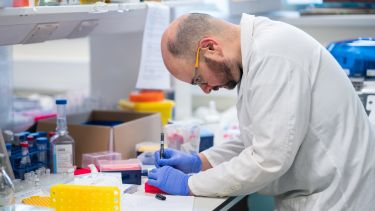Explore this course:
Applications for 2024 entry are now open. Apply now or register your interest to hear about postgraduate study and events at the University of Sheffield.
Neuroscience and Neurodegeneration
School of Medicine and Population Health,
Faculty of Health

Course description
Lead academic: Dr Jon Wood
This part-time, online course enables you to fit your studies around your other commitments, while you develop a comprehensive understanding of neuroscience and neurodegenerative disease. It covers the fundamental biology of the human nervous system, the mechanisms behind a range of illnesses, and the treatments that patients receive.
You will start with neuroanatomy, and study the human brain and spinal cord in detail. You will then learn about motor neurone disease, Alzheimer’s, Parkinson’s, Huntington’s and multiple sclerosis – how they occur, how they affect patients, and how they are studied by researchers. As you progress, you will focus more on the complex molecular and cellular mechanisms behind neurodegeneration, and how discoveries in the laboratory are translated into treatments.
In your final year, there is a choice of modules that focus on neuroscience research. You can learn about research practices on our Professional and Research Skills module, and conduct a literature review by examining the published research on a neuroscience topic. Alternatively, you can complete your own research project by, for example, analysing data or evaluating a clinical intervention.
Modules
Rather than comprising a piecemeal assortment of small modules, the course mainly consists of large coherent modules containing themes of content that are developed over the course of each module.
Each year of the course is worth 60 credits, which equates to 600 hours of study (including preparation of assessed coursework). Your studies will be split over 40 weeks of the academic year, so you should expect to devote around 15 hours per week to study over these 40 weeks.
- Introduction to Neurodegeneration
-
This module comprises an integrated set of online learning activities designed to provide an introduction to the clinical signs and pathological basis of common neurodegenerative disorders, and opportunities to enhance students' analytical and presentational skills through individual and collaborative study. It constitutes a stand-alone Postgraduate Certificate, as well as the foundation for further Postgraduate Diploma and Master's options. Students will learn about the clinical signs, pathological basis and genetics of Alzheimer's, Parkinson's, Huntington's and motor neurone diseases, as well as multiple sclerosis. Tutor support will guide acquisition of knowledge and enhance student's abilities in critical analysis and presentational skills.
60 credits
- Mechanisms of Neurodegeneration
-
This module comprises an integrated set of online learning activities designed to provide a detailed critical understanding of the cellular and molecular mechanisms underlying neurodegeneration. Opportunities will be provided to enhance students' analytical and presentational skills through individual and collaborative study. Content streams in the module will focus on the importance of proteostasis, mitochondrial biology, neuroinflammation and RNA biology in the pathogenesis of neurodegeneration. Tutor support will guide acquisition of knowledge and enhance student's abilities in critical analysis and presentational skills. Critical appreciation of peer review will be obtained through formative and summative assessment exercises.
60 credits
Core module:
- Novel Therapies for Neurodegeneration
-
This module comprises a series of online learning activities designed to provide detailed critical insight into the development of novel therapeutics for neurodegeneration. Preclinical and clinical studies utilising drugs, stem cells, antibodies and nucleotide-based therapeutics (e.g. viruses and antisense oligonucleotides) will be discussed. The different routes of administration required by discrete classes of therapeutic for effective target engagement will be considered. Case studies highlighting the importance of academic and industrial partnerships with the healthcare sector at different stages of therapeutic development will be discussed.
15 credits
You can then choose one of the following optional modules:
- Professional and Research Skills
-
This module will focus on the practicalities involved in performing audits and research with human data, both within and outside of the NHS, in terms of the ethics and research governance procedures that are required prior to collecting samples and data, thereby complementing the ethical and legal knowledge covered in the core module 'Ethical, legal and social issues in Applied Genomics'. The module will also cover the professional responsibilities of researchers, including collegial responsibilities and dealing with incidences of misconduct and good ethical practice in approaching research and the importance of evidence based practice. Students will also develop their knowledge of how to communicate scientific messages to non-expert audiences.
15 credits - Literature Review
-
This module allows students to carry out an in-depth literature-based project on a clinical, basic or translational topic, within the area of neurodegeneration, which is suitable for publication. This module aims to develop abilities in information retrieval from appropriate sources, as well as synthesis and critical analysis of published literature. New titles are provided each year by academics to address an unmet need for an original review, an updated review or questioning of a paradigm in the wider literature.
30 credits - Research Project
-
The aim of the module is to provide the opportunity to learn and apply research methodologies to test a specific scientific hypothesis. A list of projects will be made available and students will be asked to select their top choices. Having been assigned a project of their choice, the students will carry out a 20 week research project, culminating in an oral presentation and dissertation concisely written in the style of a scientific paper describing their research. Students will be expected to join in with the Departmental seminars, journal clubs and supervisor meetings, to learn and experience the role of a scientific researcher.
75 credits
The content of our courses is reviewed annually to make sure it's up-to-date and relevant. Individual modules are occasionally updated or withdrawn. This is in response to discoveries through our world-leading research; funding changes; professional accreditation requirements; student or employer feedback; outcomes of reviews; and variations in staff or student numbers. In the event of any change we'll consult and inform students in good time and take reasonable steps to minimise disruption.
Open days
An open day gives you the best opportunity to hear first-hand from our current students and staff about our courses.
Find out what makes us special at our next online open day on Wednesday 17 April 2024.
You may also be able to pre-book a department visit as part of a campus tour.Open days and campus tours
Duration
3 years part-time
Teaching
All of your teaching will take place online. You will learn through short video lectures and demonstrations, tutorials, interactive activities, quizzes, collaborative group work and discussion forums.
Assessment
You will be assessed, primarily, through written assignments and coursework, including posters and presentations you will deliver by video.
Your career
This course is great preparation for a career in neuroscience research. Many University of Sheffield graduates go on to complete a PhD and work at top universities and research institutes. Others work as researchers in the pharmaceutical industry or the NHS.
The course can provide clinicians with useful knowledge and skills to pursue a speciality such as neurology. It can also offer broader professional development for doctors and other healthcare professionals – particularly neurologists and geriatricians.
Entry requirements
You'll need at least a 2:1 undergraduate honours degree in a relevant science, engineering or medical subject.
A 2:2 degree may be acceptable depending on an interview and assessment of your previous experience in areas related to the course.
Overall IELTS score of 6.5 with a minimum of 6.0 in each component, or equivalent.
If you have any questions about entry requirements, please contact the department.
Fees and funding
Apply
You can apply now using our Postgraduate Online Application Form. It's a quick and easy process.
Any supervisors and research areas listed are indicative and may change before the start of the course.
Recognition of professional qualifications: from 1 January 2021, in order to have any UK professional qualifications recognised for work in an EU country across a number of regulated and other professions you need to apply to the host country for recognition. Read information from the UK government and the EU Regulated Professions Database.


